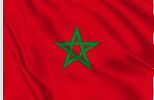Nova:Moroccan Kingdom: Difference between revisions
>Redkay128 ( ) |
>Redkay128 No edit summary |
||
| Line 20: | Line 20: | ||
[[File:Moroccan flag.jpg|thumb|154x154px]] | [[File:Moroccan flag.jpg|thumb|154x154px]] | ||
Morocco Arabic: المغرب, romanized: al-maḡrib, lit. 'place the sun sets; the west'; Standard Moroccan Tamazight: ⵍⵎⵖⵔⵉⴱ, romanized: lmeɣrib), officially the Kingdom of Morocco (Arabic: المملكة المغربية, romanized: al-mamlaka al-maḡribiyya, lit. 'The Western Kingdom'; Standard Moroccan Tamazight: ⵜⴰⴳⵍⴷⵉⵜ ⵏ ⵍⵎⵖⵔⵉⴱ, romanized: tageldit n lmeɣrib), is a country located in the Maghreb region of North Africa. It overlooks the Mediterranean Sea to the north and the Atlantic Ocean to the west, and has land borders with Spain , Caesarea | Morocco Arabic: المغرب, romanized: al-maḡrib, lit. 'place the sun sets; the west'; Standard Moroccan Tamazight: ⵍⵎⵖⵔⵉⴱ, romanized: lmeɣrib), officially the Kingdom of Morocco (Arabic: المملكة المغربية, romanized: al-mamlaka al-maḡribiyya, lit. 'The Western Kingdom'; Standard Moroccan Tamazight: ⵜⴰⴳⵍⴷⵉⵜ ⵏ ⵍⵎⵖⵔⵉⴱ, romanized: tageldit n lmeɣrib), is a country located in the Maghreb region of North Africa. It overlooks the Mediterranean Sea to the north and the Atlantic Ocean to the west, and has land borders with Spain , Caesarea | ||
<br /> | |||
=== '''Foundation and early Islamic era''' === | |||
The Muslim conquest of the Maghreb, which started in the middle of the 7th century, was achieved by the Umayyad Caliphate early into the following century. It brought both the Arabic language and Islam to the area. Although part of the larger Islamic Empire, Morocco was initially organized as a subsidiary province of Ifriqiya, with the local governors appointed by the Muslim governor in Kairouan. | |||
The indigenous Berber tribes adopted Islam, but retained their customary laws. They also paid taxes and tribute to the new Muslim administration. The first independent Muslim state in the area of modern Morocco was the Kingdom of Nekor, an emirate in the Rif Mountains. It was founded by Salih I ibn Mansur in 710, as a client state to the Umayyad Caliphate. After the outbreak of the Berber Revolt in 739, the Berbers formed other independent states such as the Miknasa of Sijilmasa and the Barghawata. | |||
According to medieval legend, Idris ibn Abdallah had fled to Morocco after the Abbasids' massacre of his tribe in Iraq. He convinced the Awraba Berber tribes to break their allegiance to the distant Abbasid caliphs in Baghdad and he founded the Idrisid dynasty in 788. The Idrisids established Fes as their capital and Morocco became a centre of Muslim learning and a major regional power. The Idrissids were ousted in 927 by the Fatimid Caliphate and their Miknasa allies. After Miknasa broke off relations with the Fatimids in 932, they were removed from power by the Maghrawa of Sijilmasa in 980. | |||
[[Category:Nations]] | [[Category:Nations]] | ||
[[Category:Africa]] | [[Category:Africa]] | ||
Revision as of 12:41, 15 February 2021
Kingdom of Morocco
| |
|---|---|
| Flag
Coat of arms | |
| Motto:
الله، الوطن، الملك (Arabic) ⴰⴽⵓⵛ, ⴰⵎⵓⵔ, ⴰⴳⵍⵍⵉⴷ (Standard Moroccan Tamazight) "God, Homeland, King" |
Morocco Arabic: المغرب, romanized: al-maḡrib, lit. 'place the sun sets; the west'; Standard Moroccan Tamazight: ⵍⵎⵖⵔⵉⴱ, romanized: lmeɣrib), officially the Kingdom of Morocco (Arabic: المملكة المغربية, romanized: al-mamlaka al-maḡribiyya, lit. 'The Western Kingdom'; Standard Moroccan Tamazight: ⵜⴰⴳⵍⴷⵉⵜ ⵏ ⵍⵎⵖⵔⵉⴱ, romanized: tageldit n lmeɣrib), is a country located in the Maghreb region of North Africa. It overlooks the Mediterranean Sea to the north and the Atlantic Ocean to the west, and has land borders with Spain , Caesarea
Foundation and early Islamic era
The Muslim conquest of the Maghreb, which started in the middle of the 7th century, was achieved by the Umayyad Caliphate early into the following century. It brought both the Arabic language and Islam to the area. Although part of the larger Islamic Empire, Morocco was initially organized as a subsidiary province of Ifriqiya, with the local governors appointed by the Muslim governor in Kairouan.
The indigenous Berber tribes adopted Islam, but retained their customary laws. They also paid taxes and tribute to the new Muslim administration. The first independent Muslim state in the area of modern Morocco was the Kingdom of Nekor, an emirate in the Rif Mountains. It was founded by Salih I ibn Mansur in 710, as a client state to the Umayyad Caliphate. After the outbreak of the Berber Revolt in 739, the Berbers formed other independent states such as the Miknasa of Sijilmasa and the Barghawata.
According to medieval legend, Idris ibn Abdallah had fled to Morocco after the Abbasids' massacre of his tribe in Iraq. He convinced the Awraba Berber tribes to break their allegiance to the distant Abbasid caliphs in Baghdad and he founded the Idrisid dynasty in 788. The Idrisids established Fes as their capital and Morocco became a centre of Muslim learning and a major regional power. The Idrissids were ousted in 927 by the Fatimid Caliphate and their Miknasa allies. After Miknasa broke off relations with the Fatimids in 932, they were removed from power by the Maghrawa of Sijilmasa in 980.
